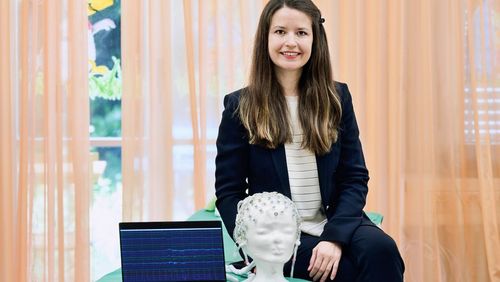
Measuring fatigue
Computer scientist Pietro Oldrati is preparing to launch a digital measurement platform to help people suffering from fatigue—thanks to a MedTechEntrepreneur Fellowship from the University of Zurich.
Chronic illnesses often go hand in hand with a broad range of symptoms. One of the most frequent—and underestimated—is fatigue. People with multiple sclerosis, cancer, rheumatic diseases or long Covid often experience physical and mental exhaustion. Even sleep and rest fail to bring relief, and everyday life can become a struggle. “People with fatigue are forced to limit their activities and workload. Their lives change completely,” says Pietro Oldrati.
Oldrati, a computer scientist, is an academic associate at University Hospital Zurich. Since completing his master’s thesis in 2018, he has focused on developing new methods to measure fatigue, primarily in multiple sclerosis patients. Up to ninety-five percent of all people with MS suffer from fatigue; many describe it as the most debilitating symptom of their illness.
Lack of objective measurements
“However,” Oldrati says, “modern medicine has yet to understand what causes fatigue or how it can be treated.” This is because defining fatigue has proven elusive: it varies from patient to patient and, to date, no methods have been developed to objectively measure the severity of symptoms. Patients are typically asked to fill out a questionnaire. “But experiences and memories are subjective,” Oldrati explains. Moreover, the questionnaires are often completed only once a year. “Yet levels of fatigue vary, they come and go.”
This is why Oldrati is convinced that fatigue should be measured more frequently and more precisely in order to understand it—and to develop
treatments. Today, doctors often have few options other than recommending a change in diet or prescribing medications such as Ritalin that haven’t been approved for fatigue syndrome.
Smartphones plus wearables
Together with a team of neurologists and other computer scientists at University Hospital Zurich, Pietro Oldrati has plans to develop a platform to measure fatigue levels. Their method uses smartphones and wearable technology—smartwatches and fitness trackers that record data.
In spring 2022, Oldrati was awarded a MedTechEntrepreneur Fellowship to pursue his project. The University of Zurich funding programme is financed by the Werner Siemens Foundation and endowed with a scholarship of 150 000 Swiss francs. The fellows are also mentored by experienced coaches who help them overcome the myriad obstacles on the rocky road to establishing a firm; they also have access to the UZH Incubator Lab and the opportunity to join a network of current and former fellowship holders.
Oldrati and his team are working on three measurement methods for their platform. The first is a patient questionnaire app that allows data to be collected more frequently than is currently the practice at medical centres. The second method involves tests completed on a smartphone to measure levels of fatigue throughout an activity. An example is a five-minute test requiring the patient to match patterns as quickly as possible. “Because the test is tiring, performance deteriorates over time,” explains Oldrati. “That can be measured objectively—and people with fatigue demonstrate a higher drop in performance.”
Irregular heartbeat
In the final method, the measurements are carried out directly on the body. A monitor worn on the patient’s upper arm functions as a pedometer
and records the interval between two heartbeats. “People with multiple sclerosis and other diseases often exhibit fluctuations in heart rate variability,” says Oldrati.
Pietro Oldrati is convinced that combining the three measurement methods will enable medical professionals to make precise observations of fatigue without placing an undue burden on the patient. In order for his platform to succeed on the market, however, it must do more than just reliably prove the existence of fatigue. “It’s also important to find a simple way for doctors to integrate this information into everyday treatments,” Oldrati says. If his endeavour succeeds, the outlook is promising—both for the planned start-up company and for people suffering from debilitating fatigue.







